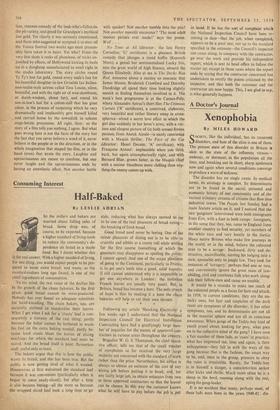Consuming Interest
Half-Baked
By LESLIE ADRIAN To my mind, the real cause of the decline lies in the growth of the chain bakeries. In the first place, good bread cannot be mass-produced. Nobody has ever found an adequate substitute for hand-kneading. The chain bakers, too, are naturally inclined to standardise their loaves. What I get when I ask for a 'crusty' loaf is con- sequently a travesty of the real thing; partly because the baker cannot be bothered to waste his fuel on the extra baking needed, partly be- cause hard crusts blunt the knives of slicing machines for which the standard loaf must be suited. And the bread itself is pOor, flavourless stuff, useful only as toast.
The bakers argue that this is how the public wants its bread; and this has been true. But the public is now getting tired of what it wanted. Housewives at first welcomed the standard loaf because it was convenient (particularly when it began to come ready-sliced); but after a time it also became boring—all the more so because the wrapped sliced loaf took a long time to go stale, reducing what has always seemed to me to be one of the real pleasures of bread eating— the breaking of fresh bread.
Good bread need never be boring. One of the minor pleasures of dining out is to be able to crumble and nibble at a crusty roll while waiting for the first course (something of which the gourmets may disapprove as spoiling the palate;' I cannot agree). And one of the major pleasures of going to the Continent, particularly to France, is to get one's teeth into a good, solid baguette (I still cannot understand why it is impossible to get one anywhere in London : the imitation French loaves are usually very poor). But, in Britain, bread has become a bore. The only crumb of hope is that by making it a bore the chain bakeries will help to cut their own throats.
* *
Following my article `Shocking Electricity' a few weeks ago I understand that the National Inspection Council for Electrical Installation Contracting have, had a gratifyingly large num- ber of inquiries for the names of approved con- tractors in various areas throughout the country.
Brigadier W. G. S. Thompson, the chief execu- tive officer, tells me that of the small number of complaints so far received the very large majority are concerned with the standard of work rather than the price. Nevertheless, his advice is always to obtain an estimate of the cost of any wiring job before putting it in hand; and, for any fairly large job, to obtain estimates from two or three approved contractors so that the lowest can be chosen. In this way the customer knows what he will have to pay before the job is put in hand. If he has the sort of complaint which the National Inspection Council have been re- ceiving to date—that the job, when completed, appears to be a poor one, not up .to the standard specified in the estimate—the Council's inspector can come along, in company with the contractor, go over the work and provide his independent report, which is sent to head office to follow the matter up; except in those cases where the report ends by saying that the contractor concerned has undertaken to rectify the points criticised by the inspector, and that both the customer and the contractor are now happy. This, I am glad to say, is what generally happens.


































 Previous page
Previous page